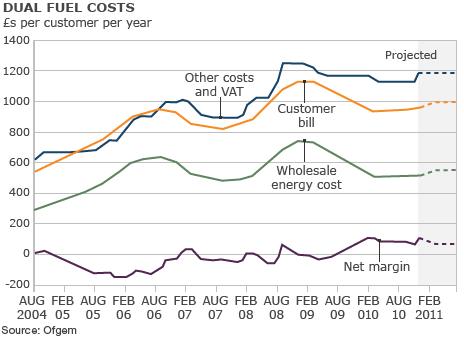Energy firms facing gas and electricity price review
- Published
Ofegm's Alistair Buchanan: 'We're very concerned, on behalf of consumers'
Ofgem is to investigate recent energy price rises, as it says they have significantly widened suppliers' profit margins.
The watchdog said that the net profit margin of £65 per typical customer in September was now £90, a 38% rise.
The calculations take into account price rises announced by three of the "big six" suppliers in recent weeks.
Energy UK, which represents the major energy suppliers, said it had "nothing to hide" during a review.
Ofgem will review the domestic energy market to see if more action is needed to protect consumers.
A previous investigation of the market in October 2008 found no evidence of anti-competitive behaviour in the sector.
Review
The work will be completed by March 2011, and will study the "effectiveness of the retail market".
The regulator said it was asking if "companies are playing it straight with consumers" after the latest figures showed a 38% rise in profit margins from the typical dual-fuel customer in the last three months.
"The energy retail market can only be fully effective if consumers have confidence that the market is transparent and easy to take part in," said Ofgem chief executive Alistair Buchanan.
"So we will go beyond our usual quarterly reports on prices and do a comprehensive review of the retail market and our recent reforms from the consumers' perspective.
"Greater transparency in the market is good for consumers, investors and for the energy industry as a whole."
Last week, Scottish Power said its customers' electricity bills would rise by an average of 8.9% while prices for gas customers would increase by an average of 2%.
This came after Scottish and Southern Energy said it would put up its domestic gas tariffs by 9.4% at the start of December.
British Gas customers also face a 7% rise in gas and electricity bills this winter.
EDF Energy said that it would freeze prices for domestic customers over the winter.
Competition?
The review will not immediately make any change to customers' bills.

However it was understandable that consumers be reassured that companies were not "lining their pockets", Mr Buchanan told the BBC.
Ofgem had the power to make some changes to the way companies operated, he added.
But they could also ask for more legislative support from the government or go to the Competition Commission.
Adam Scorer, of watchdog Consumer Focus, said that there was no cartel among the big energy suppliers.
"What the Ofgem review will not show is that the CEOs [chief executives] of the six major suppliers are huddling around a park bench with a calculator," he said.
The problem was the structure of the market, he said, that prevented it being competitive, and it was impossible for a new entrant into the sector to challenge the major suppliers' dominance.
"They do not feel the hot breath of competition on their necks," he said.
But Energy UK, which represents the major suppliers, said that energy pricing was a complex business.
McGourty: 'We believe in an open, fair and transparent market'
"The energy companies have been working closely with Ofgem for some time to implement an array of reforms that should bring significant benefits to customers," said Christine McGourty, director of Energy UK.
"We welcome this review as an opportunity to explain energy pricing. We have nothing to hide and believe in transparency in this complex marketplace.
"The review is the latest in a long line of investigations into the energy market in recent years and no previous investigation has found anything to concern the competition authorities.
"Ofgem's own analysis of profits across the sector shows that energy supply businesses have operated at a loss for many years of the last decade."
The spokesman added that the latest profit margin will be eroded as wholesale prices rise.
A spokesman for British Gas said it expected margins in the second half of 2010 to be an average of 3% to 4% on residential energy sales, arguing that Ofgem's figures did not take account of the "growing impact" of energy efficiency on customers' bills.